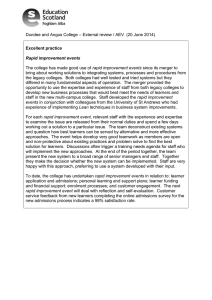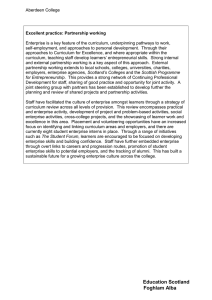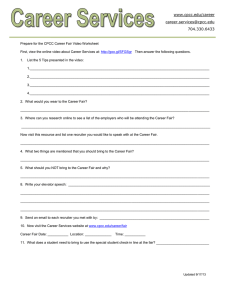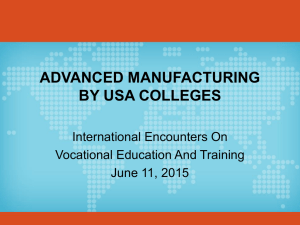Becoming an Intentional Learning College
advertisement
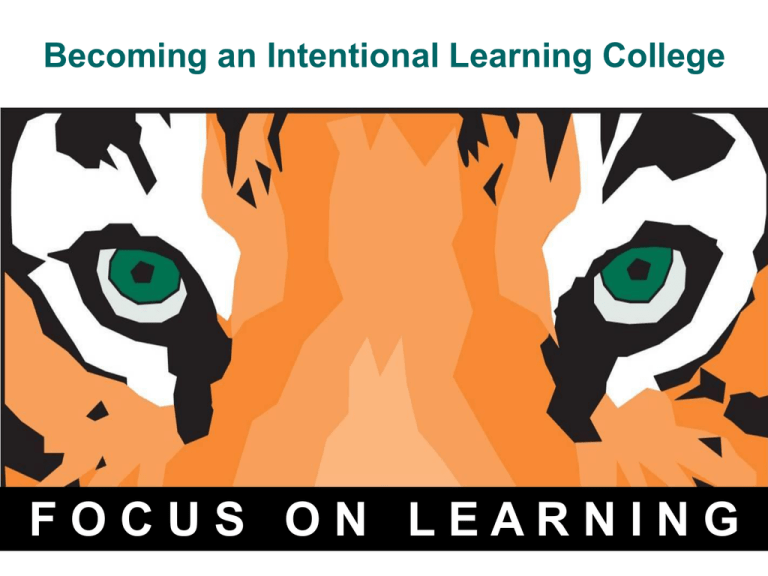
Becoming an Intentional Learning College FOCUS ON LEARNING “The successful community colleges in the 21st century will be colleges where faculty members can demonstrate that their teaching strategies are in fact causing learning.” -George A. Baker III I. It’s a New Day for Teaching & Learning II. Learning is a Natural Function of the Brain III. Guiding Principals for a Learning College IV. Strategically Planning & Implementing I. It’s a New Day for Teaching and Learning Access is not enough! Good Teaching is not enough! Good Intentions are not enough! Economy demands greater efficiency & accountability. “Leaders are Anticipatory Thinkers” It’s a New Day for Teaching and Learning Today’s colleges must learn to move from “Teaching & Teachers” to “Learning & Learners”. Community colleges exist to provide added value to students & their communities. We must measure that value via learning outcomes. Nothing affects our future like our ability to educate!~ Labor & Skills Gaps Labor Force Trends Greatest worker shortage in America’s history will return. 40-60% of jobs in 2015 don’t exist today. 70% of recent high school graduates require remediation. Last chance for H. S. dropouts. Jobs of the future require higher skills & knowledge.~ Labor & Skills Gaps Community College Trends 66% of colleges expect higher turnover. 65% expect more FT faculty to retire than in the past 10 years. 97% expect a greater need for public service workers, i.e. nurses, teachers, police. 84% expect difficulty in recruiting leaders.~ -League for Innovation Change is at Hand! “The time for fundamental change is when society’s needs can no longer be met by the institutions that serve it.” -Al Lorenzo Economy Globalization Technology Changing Demographics Curriculum & delivery must have a variety of options Students must get engaged. Pre and post assessments – (We must measure what learning occurs)~ Change is at Hand! We now accept the fact that learning is a lifelong process of keeping abreast of change. And the most pressing task is to teach people how to learn. Peter F. Drucker, Economist Change is at Hand! Students must leave colleges with a core set of workplace skills: 12. Experience –work, internships, etc. 11. Academic & Technical Skills 10. Be Active Learners 9. Be Forward Thinking 8. Be Organized 7. Be Results Oriented 6. Be Service Oriented 5. Be a Problem Solver 4. Be a Team Player Change is at Hand! Students must leave colleges with a core set of workplace skills: 3. Strong Work Ethic 2. Good Communicator 1. Positive Attitude! 12 Laws for Becoming Indispensable - Zeiss II. Learning is Natural Function of the Brain Learning becomes easier as we learn. People have preferred learning styles. Past age 25, age has nothing to do with learning. Restructure pathways intentionally. Use it or lose it.~ Stress Test The picture that you will see has 2 almost identical dolphins in it. Look at both dolphins jumping out of the water. In spite of the fact that the dolphins are identical, a person under stress will find differences in the two dolphins. Look at the photograph and if you find more than one or two differences you are under great stress and may want to take a vacation. Perception Theory Contextual Learning Contextual Learning III. Guiding Principles for a Learning College Learning must be the centerpiece of the college & its strategic plan. Everyone is responsible for learning! Learning is the goal for students, all employees, and the college itself.~ Guiding Principles for a Learning College Seven key elements in a learning organization: 1. The Learning College creates substantive change in individual learners. 2. The Learning College engages learners in the learning process as full partners who must assume primary responsibility for their own choices. 3. The Learning College creates and offers as many options for learning as possible. 4. The Learning College assists learners to form and participate in collaborative learning activities. Guiding Principles for a Learning College Seven key elements in a learning organization: 5. The Learning College defines the roles of learning facilitators in response to the needs of the learners. 6. The Learning College and its learning facilitators succeed only when improved and expanded learning can be documented for learners. 7. All Learning College employees identify their role in supporting learning.~ - Terry O’Bannion The Learning College asks Two Essential Questions: 1. How will any action or decision improve learning? 2. How do we know? (Director of Assessment)~ Core Learner Competencies Communication Critical Thinking Personal Growth & Responsibility Information Technology~ Learner Retention Rates 5% Lecture 10% Reading 20% Audio visual 30% Demonstrative 50% Discussion 75% Practice by doing 90% Teaching others~ Source: Jon Erlendron IV. Strategically Planning & Implementing Learning-Centered Colleges give learning more attention and become more intentional in efforts to support learning. Align College Values to Support Learning LearningCentral to the Strategic Plan Student Employee College College Goal 1: Student Success College Goal 2: Professional Development College Goal 2: Organizational Development CPCC Learning Activities Learning Dialogues: Cross-functional discussions with college personnel regarding the learning college concept. 400 participants 25 dialogues~ CPCC Learning Activities Title III - Improving Academic and Student Support Services for High Risk Students Enhancing learning outcomes for students by– Helping students become more self-directed learners Implementing an Online Student Profile tracking system Improving instruction through targeted training Implementing Student Success Centers. CPCC Learning Activities Learning Leaders Awards Learning Fellows (Release time) Learning Communities Service Learning Technological support e.g. Smart Classrooms, student portal, online schedule, catalog & bookstore~ Other Learning College Initiatives CPCC Leadership Program President’s Council Doctoral Support Group President’s Entrepreneurial Council Revised Faculty Professional Development Plan focused on Learning New Faculty Orientation Adjunct Faculty Certification Learning College Steering Committee~ Keeping it Simple Strategically Four Levels of Separation & Support 1. College Goals 2. VP Unit Objectives 3. Department Action Plan 4. Personal Development Plan~ Measure and Report Goals Personal Development Plan Reviews Department Action Plans Unit Objectives Accomplishments Under Goals~ Power Point Presentation: www.cpcc.edu/president/presentations Learning College Website: www1.cpcc.edu/Learning College
